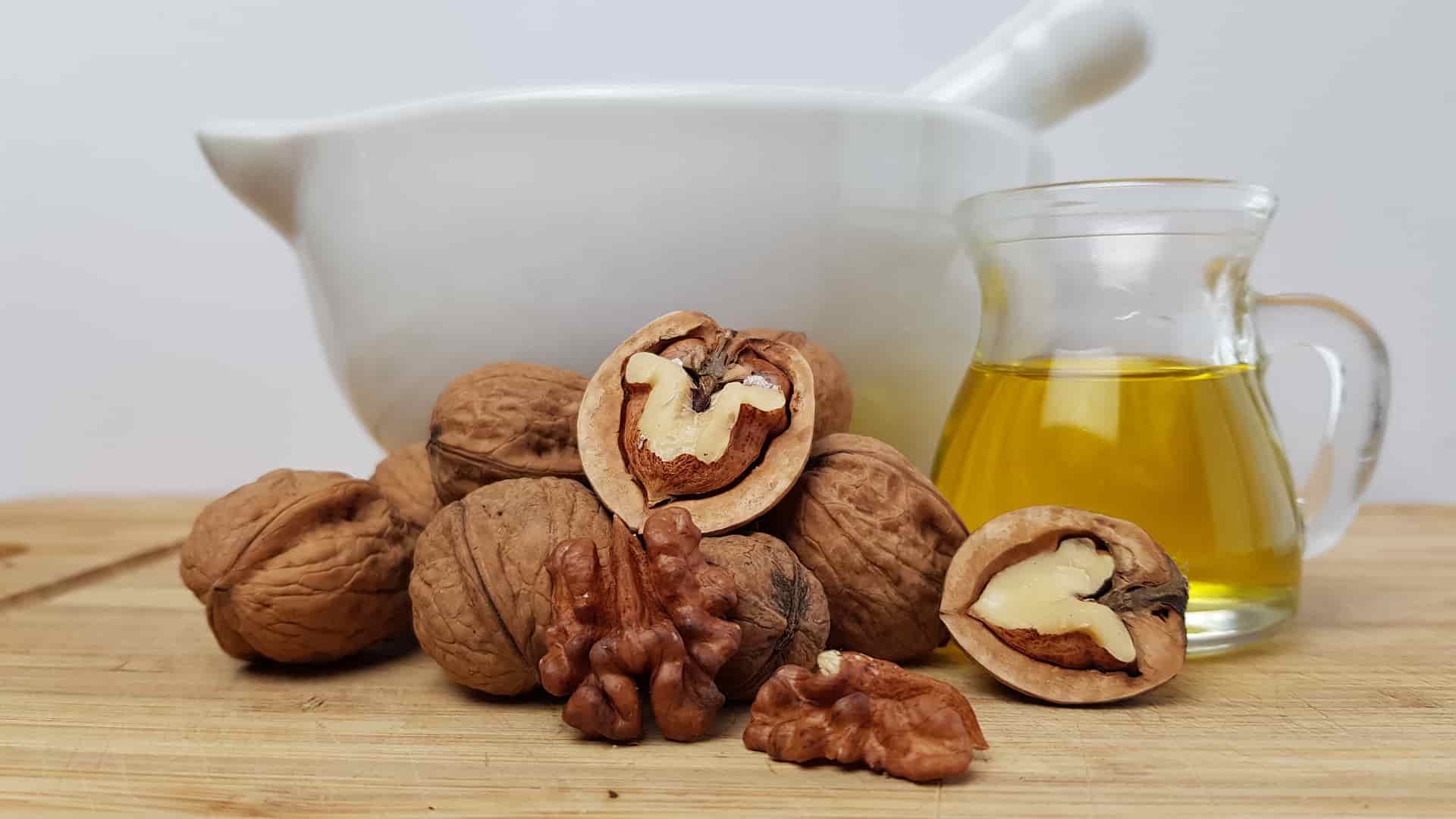Summary. Walnut oil is healthy as a dressing or meal topping, thanks to its unique fatty acid profile and plant bioactives. However, you’ll want to avoid cooking walnut oil at high heat due to its low smoke point. Opt for cold-pressed walnut oil over refined walnut oil when you can.

What is the nutritional value of walnut oil?

Walnuts are considered one of the healthiest nuts. Walnut oil is extracted from pressed walnuts. Read on to find out everything you need to know about walnut oil, its benefits, how it compares with olive oil, and more.
Walnuts are rich in nutrients and are considered a particularly great source of antioxidants like selenium. According to the United States Department of Agriculture (USDA), 1 tablespoon (13.6 grams) of walnut oil also contains 120 kilocalories and 13.6 grams of fat. It doesn’t contain any carbs (sugars), proteins, or fiber. The main fat in walnut oil is the omega-3 fatty acid alpha-linolenic acid (ALA). This is a polyunsaturated essential fatty acid.
In terms of other nutrients, walnut oil is a rich source of vitamin K.
What are the health benefits of walnut oil?
Here are some of the potential health benefits of walnut oil. This oil sometimes:
Reduces inflammation
Walnut oil contains a group of polyphenol compounds called ellagitannins. These are converted into beneficial chemicals by the good bacteria in your gut. These chemicals have antioxidant and anti-inflammatory properties, meaning that they can reduce inflammation and mitigate cell damage suffered by the body.
ALA, which is an omega-3 fatty acid, is the main component of walnut oil. Omega-3 fatty acids have anti-inflammatory properties and decrease the number of inflammatory proteins being produced in the body.
Has anticancer properties
Your body converts the ellagitannins in walnut oil into ellagic acid and then into urolithins. In lab studies, urolithins were able to kill prostate cancer cells and regulate the levels of a chemical called prostate-specific antigen (PSA), which is a major risk factor for prostate cancer .
In other observational and animal studies, eating walnuts has also been associated with a decreased risk of breast and colorectal cancer.
Additional research in large human populations is needed, though, to confirm these findings.
Enhances skin quality
Walnut oil contains two essential fatty acids — omega-3 ALA and omega-6 linoleic acid (LA).
ALA can be converted into two other omega-3 fatty acids called eicosapentaenoic acid (EPA) and docosahexaenoic acid (DHA). EHA and DHA are important components of your skin structure. Therefore, omega-3 fatty acids are critical for proper wound healing, normal skin growth, and fighting against skin inflammation and other conditions.
LA is the main component of the external layer of the skin. That’s why consuming enough LA is critical to maintaining good skin health.
Decreases blood pressure
High blood pressure (hypertension) is one of the main risk factors for heart disease. Walnut oil, though, contains beneficial fatty acids like ALA and LA and antioxidants like polyphenols that can help to regulate blood pressure.
After taking walnut oil, overweight and obese people with high cholesterol levels have experienced considerable improvement in blood vessel function, which, in turn, can decrease blood pressure.
Regulates blood sugar
Walnut oil contains a lot of antioxidants, which can fight against the oxidative stress caused by high blood sugar levels. This effect is particularly beneficial to people with type 2 diabetes, who usu ally have high blood sugar levels.
Increased blood sugar levels have been associated with many harmful effects like organ damage, heart disease , and stroke. To prevent these conditions, your blood sugar must be maintained at normal levels.
A study found that 100 people with diabetes who took 1 tablespoon of walnut oil daily for 3 months had significantly lower blood sugar and hemoglobin A1C (a measure of long-term blood sugar) levels, indicating better diabetes control.
Manages cholesterol levels
Walnuts and walnut oils are great sources of antioxidants and omega-3 fatty acids, which are considered good fats . They can regulate cholesterol levels by decreasing triglyceride and bad ( LDL) cholesterol, which are risk factors for heart disease.
According to one study, people who took 3 grams of walnut oil in capsule form daily for 45 days showed significantly reduced triglyceride levels.
10 Amazing Health Benefits Of Walnut Oil For Skin, Hair & Health || Benefits of Walnuts Oil
FAQ
What is the difference between refined and unrefined walnut oil?
Is walnut oil as healthy as olive oil?
What is the best type of walnut oil?
What are the side effects of walnut oil?
Is walnut oil healthy?
Walnut oil is healthy as a dressing or meal topping, thanks to its unique fatty acid profile and plant bioactives. However, you’ll want to avoid cooking walnut oil at high heat due to its low smoke point. Opt for cold-pressed walnut oil over refined walnut oil when you can. Walnut oil vs. other oils.
Are walnuts good for you?
Yes, walnuts are good for you. Walnuts are high in plant based omega 3, called ALA, which has been shown to be beneficial in maintaining brain health. In addition, walnuts are also a great source of copper and manganese, trace minerals that people often forget about. Walnuts are also a great source of certain vitamins such as vitamin B6, B9 and E.
Should walnut oil be refrigerated?
It has a rich, nutty flavor and is best for salad dressings and as a flavor booster to finish a dish,” says Levinson. “Just be sure to keep it refrigerated,” says Levinson. Walnut oil is ideal for desserts and other recipes that benefit from a nutty flavor, adds Warren.
Should I buy walnut oil?
When buying walnut oil, your best bet is to spend a bit more money on quality oil that is made from entirely dried and cold-pressed or expeller-pressed walnuts. This type is superior to oil infusions made with a combination of walnut oil and cheaper vegetable oils.
